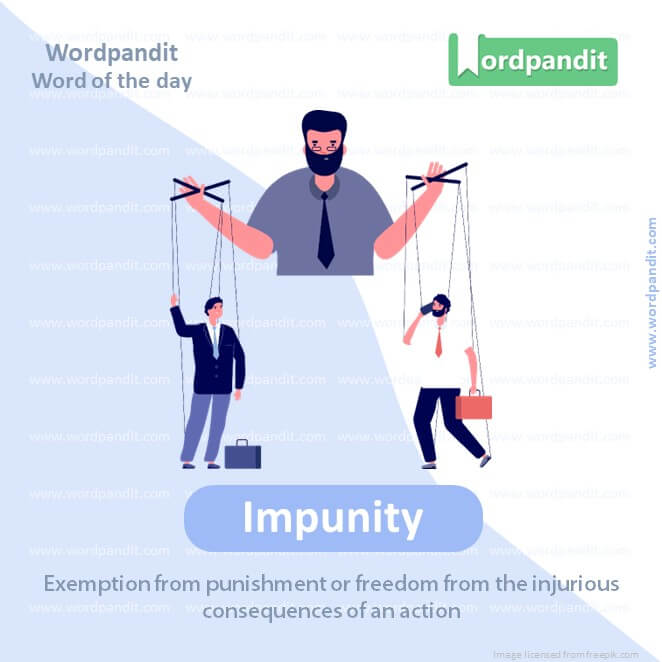Daily Vocabulary Words: List of Daily Used Words in Leading International Newspapers
Hi there. Welcome to this special section @ Wordpandit.
Our endeavour here is very simple: to highlight important daily vocabulary words, which you would come across in leading newspapers in the country. We have included the following newspapers in our selection:
• The New York Times
• The Washington Post
• Scientific American
• BBC
• The Guardian
• Psychology Today
• Wall Street Journal
• The Economist
We are putting in extensive work for developing your vocabulary. All you have got to do is be regular with this section and check out this post on a daily basis. This is your repository of words that are commonly used and essentially, we are posting a list of daily used words. Hence, this has significant practical application as it teaches you words that are used commonly in leading publications mentioned above.
Visit the website daily to learn words from leading international newspapers.
WORD-1: INTERNMENT
CONTEXT: “Historians continue to reflect on the dark period of internment camps during wartime, examining the lasting impact on affected communities.”
SOURCE: The Guardian
EXPLANATORY PARAGRAPH: Imagine if someone told you that you had to stay in a specific place for a while, and you couldn’t leave that place. This is called internment. It’s like a time-out, but usually for adults, and it can be for various reasons.
MEANING: The act of confining people, often large groups, especially for political or military reasons (noun).
PRONUNCIATION: in-TERN-ment
SYNONYMS: Detainment, confinement, captivity, imprisonment, incarceration, detention, custody, restraint.
USAGE EXAMPLE:
1. The history books discussed the internment of Japanese Americans during World War II.
2. The internment camp was surrounded by high fences.
3. Many people protested against the unjust internment of innocent citizens.
4. The documentary shed light on the conditions within the internment camps.
WORD-2: BLIGHT
CONTEXT: “The urban blight in the city center has sparked discussions on revitalization efforts and community development.”
SOURCE: The New York Times
EXPLANATORY PARAGRAPH: Imagine your favorite toy starting to break or not work properly. That’s sort of like blight but for plants. Blight makes plants sick or stops them from growing well.
MEANING: A disease that damages or destroys plants (noun); to spoil or damage something severely (verb).
PRONUNCIATION: bl-eye-t
SYNONYMS: Affliction, plague, disease, scourge, devastation, rot, corruption, decay.
USAGE EXAMPLE:
1. The farmer was worried about the blight affecting his tomato plants.
2. The old building was a blight on the city’s skyline.
3. Many trees in the area were affected by a severe blight.
4. Unchecked pollution can blight a beautiful landscape.

WORD-3: PIONEER
CONTEXT: “The young entrepreneur was hailed as a pioneer in sustainable technology, leading the way in eco-friendly innovations.”
SOURCE: Scientific American
EXPLANATORY PARAGRAPH: Think about the first person who ever tried a new type of game or activity at school. They were brave and tried something new. A pioneer is someone like that, but they might be the first to explore new places or come up with new ideas.
MEANING: A person who is among the first to explore or settle in a new area (verb).
PRONUNCIATION: pie-OH-neer
SYNONYMS: Trailblazer, innovator, groundbreaker, explorer, settler, frontrunner, initiator, forerunner.
USAGE EXAMPLE:
1. Amelia Earhart was a pioneer in aviation.
2. The company aimed to pioneer new ways of recycling.
3. The pioneers settled in the western territories in the 1800s.
4. Being a pioneer in any field requires courage and determination.

WORD-4: SEXISM
CONTEXT: “The #MeToo movement shed light on the prevalence of sexism in various industries, sparking conversations about gender equality.”
SOURCE: The Washington Post
EXPLANATORY PARAGRAPH: Imagine if someone said that boys can only play with trucks and girls can only play with dolls. That wouldn’t be fair, right? Sexism is when people believe or act like one gender is better than the other or can only do certain things.
MEANING: Prejudice, stereotyping, or discrimination, typically against women, on the basis of sex (noun).
PRONUNCIATION: SEX-ism
SYNONYMS: Gender bias, chauvinism, misogyny, discrimination, prejudice, bigotry, gender discrimination, partiality.
USAGE EXAMPLE:
1. The company was accused of sexism in its hiring practices.
2. It’s essential to teach children about the dangers of sexism from a young age.
3. Many movies from the past have been criticized for their blatant sexism.
4. The campaign aimed to raise awareness about everyday acts of sexism.
WORD-5: ANTI-WOKE
CONTEXT: “Some political figures have embraced an anti-woke stance, positioning themselves against what they see as excessive political correctness.”
SOURCE: The Economist
EXPLANATORY PARAGRAPH: You know when someone learns something new and important, we might say they “woke up” to that idea? Well, some people disagree with or are against these new ideas, and those people might be called “anti-woke”.
MEANING: Opposed to or critical of progressive or liberal views, especially in relation to social justice issues (adjective).
PRONUNCIATION: an-tie-WOKE
SYNONYMS: Conservative, traditionalist, reactionary, regressive, opposed, dissenting, resistant, counter.
USAGE EXAMPLE:
1. The author’s anti-woke statements sparked controversy.
2. Some feel that the anti-woke movement is a response to rapid societal change.
3. She criticized the comedian for making anti-woke jokes.
4. The group held an anti-woke rally in the city center.
WORD-6: EMBRACING
CONTEXT: Schools are embracing new teaching methods to adapt to the digital age, offering students innovative ways to learn.
SOURCE: BBC
EXPLANATORY PARAGRAPH: Imagine giving someone a big, warm hug. That’s kind of like embracing, but it can also mean accepting or using an idea or way of doing things.
MEANING: Hugging someone tightly (verb); accepting or supporting willingly and enthusiastically (verb).
PRONUNCIATION: em-BRAY-sing
SYNONYMS: Hugging, cuddling, clasping, enfolding, accepting, welcoming, adopting, taking up.
USAGE EXAMPLE:
1. They were embracing each other when I walked into the room.
2. The community is embracing the new recycling program.
3. Embracing change can lead to personal growth.
4. He’s been embracing new methods to improve productivity.

WORD-7: IMPUNITY
CONTEXT: Calls for justice grow louder as human rights activists condemn the culture of impunity surrounding cases of police misconduct.
SOURCE: Al Jazeera
EXPLANATORY PARAGRAPH: Imagine if someone took your toy, and no one told them it was wrong or stopped them. That means they did something bad and didn’t get in trouble. This idea is called impunity.
MEANING: Exemption from punishment or freedom from the injurious consequences of an action (noun).
PRONUNCIATION: im-POON-ity
SYNONYMS: Immunity, exemption, freedom, liberty, invulnerability, protection, safety, license.
USAGE EXAMPLE:
1. The dictator ruled with impunity for many years.
2. Criminals should not be allowed to act with impunity.
3. The corrupt politician conducted his affairs with impunity.
4. Impunity for human rights violations is a significant concern.
WORD-8: REPUDIATE
CONTEXT: In a surprising turn of events, the opposition party chose to repudiate the controversial bill they had initially supported.
SOURCE: The Guardian
EXPLANATORY PARAGRAPH: Imagine if you said you didn’t want your broccoli because you didn’t like it. That’s a bit like “repudiate”, but for bigger things. Repudiate means to say no to something or to deny it.
MEANING: To reject or deny the truth or validity of something (verb).
PRONUNCIATION: re-PUDE-ee-ate
SYNONYMS: Reject, disown, renounce, deny, refuse, discard, abandon, disavow.
USAGE EXAMPLE:
1. She repudiated the rumors about her past.
2. The politician repudiated his earlier statements.
3. Many in the community repudiate the idea of building a new mall.
4. To gain trust, he needed to repudiate his previous actions.

WORD-9: INHOSPITABLE
CONTEXT: The inhospitable conditions of the remote region have deterred most travelers, but adventurers are drawn to its untouched landscapes.
SOURCE: The New York Times
EXPLANATORY PARAGRAPH: Think about a place where it’s super cold, and there’s no shelter or food. It would be tough to live there, right? When a place is hard to live in or visit, we call it inhospitable.
MEANING: Unfriendly and unwelcoming; harsh or difficult to live in (adjective).
PRONUNCIATION: in-HOS-pit-able
SYNONYMS: Unwelcoming, unfriendly, hostile, harsh, bleak, desolate, barren, unforgiving.
USAGE EXAMPLE:
1. The desert can be an inhospitable environment without proper preparation.
2. The team faced inhospitable conditions while climbing the mountain.
3. She found the villagers to be rather inhospitable.
4. It’s an inhospitable region with extreme temperatures.
WORD-10: HANDIWORK
CONTEXT: The intricate handiwork of the local artisans has gained international recognition, with their craftsmanship sought after by collectors worldwide.
SOURCE: The Economist
EXPLANATORY PARAGRAPH: Imagine if you made a lovely drawing or built something with your blocks. That special thing you created with your hands is your handiwork. It’s like a show-off of what you can do!
MEANING: Something made or done by a person’s hands; a person’s work or craftsmanship (noun).
PRONUNCIATION: HAND-ee-work
SYNONYMS: Craftsmanship, work, creation, product, masterpiece, labor, workmanship, output.
USAGE EXAMPLE:
1. The beautifully carved statue is the handiwork of a skilled artist.
2. Her garden is a testament to her handiwork and dedication.
3. The detective recognized the criminal’s handiwork from previous cases.
4. The quilt was a piece of her grandmother’s handiwork.
Vocabulary Daily Use
In the fascinating world of language learning, we often concentrate on taking giant leaps, but the real magic lies in the small steps of ‘vocabulary daily use’. These frequently used words and phrases form the backbone of practical communication and understanding. Therefore, mastering ‘vocabulary daily use’ is a crucial element in achieving language fluency.
To effectively learn ‘vocabulary daily use’, one needs to venture beyond the traditional textbook resources. The real essence of these words unveils itself in everyday exposure and interactions. Engaging with a variety of material like novels, magazines, newspapers, podcasts, films and digital content deepens the understanding of ‘vocabulary daily use’. Immersion in these contexts yield natural, everyday language that bridges the gap between the classroom and the real world.
The journey of mastering ‘vocabulary daily use’ necessitates the integration of innovative memory techniques. Flashcards and the Leitner System aid in embedding these words into your long-term memory by promoting active recall. Additionally, the use of mnemonic devices, which allow you to associate ‘vocabulary daily use’ with personal and familiar narratives, can enhance your ability to remember and recall these words.
Moreover, it’s important to remember that ‘vocabulary daily use’ isn’t just about comprehension- it’s about practice and active usage. Incorporate these words in your day-to-day communication and social interactions. This not only solidifies your understanding but also accelerates learning and internalization of ‘vocabulary daily use’.
In a nutshell, mastering ‘vocabulary daily use’ is a continual process that demands exposure, creative learning strategies and assertive practice. The commingling of these tactics brews the perfect formula that allows learners to seamlessly integrate ‘vocabulary daily use’ into their linguistic repertoire. And with that, they can navigate the nuances of language with confidence and ease.













